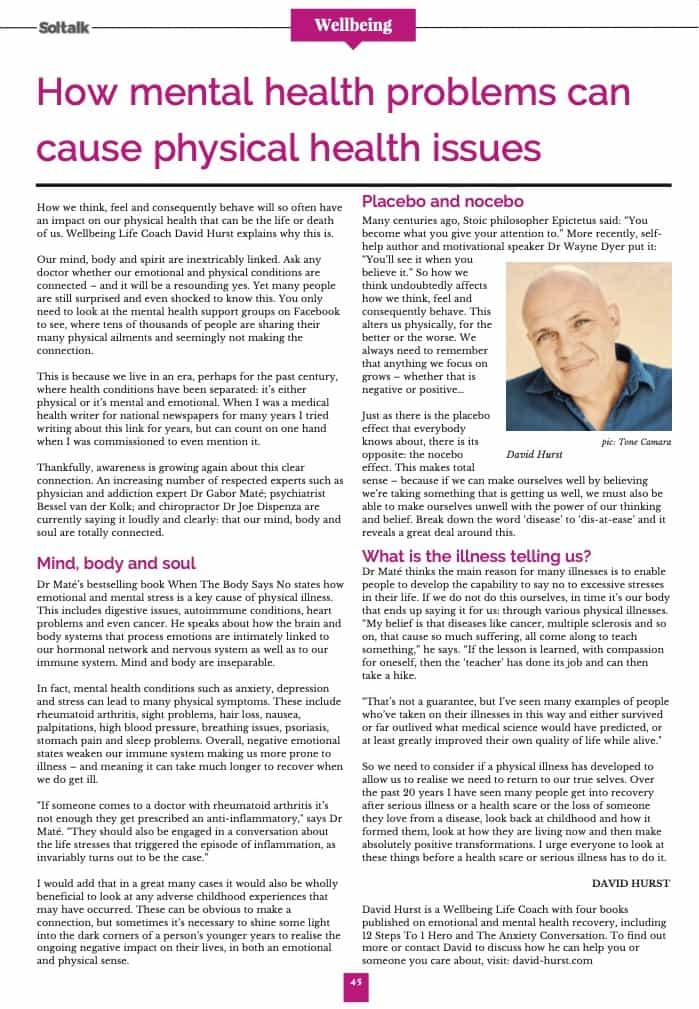How mental health problems will so often cause physical health problems

How we think, feel and consequently behave will so often have an impact on our physical health that can be the life or death of us. That’s because our mind, body and spirit are inextricably linked.
Ask any doctor whether our emotional and physical conditions are connected – and it will be a resounding yes. Yet many people are still surprised and even shocked to know this. You only need to look at the mental health support groups on Facebook to see, where tens of thousands of people are sharing their many physical ailments and seemingly not making the connection.
This is because we live in an era, perhaps for the past century, where health conditions have been separated: it’s either physical or it’s mental and emotional. When I was a medical health writer for national newspapers for many years I tried writing about this link for years, but can count on one hand when I was commissioned to even mention it.
Thankfully, awareness is growing again about this clear connection. An increasing number of respected experts such as physician and addiction expert Dr Gabor Maté; psychiatrist Bessel van der Kolk; and chiropractor Dr Joe Dispenza are currently saying it loudly and clearly: that our mind, body and soul are totally connected.
Mind, body and soul
Dr Maté’s bestselling book When The Body Says No states how emotional and mental stress is a key cause of physical illness. This includes digestive issues, autoimmune conditions, heart problems and even cancer.
He speaks about how the brain and body systems that process emotions are intimately linked to our hormonal network and nervous system as well as to our immune system. Mind and body are inseparable.
In fact, mental health conditions such as anxiety, depression and stress can lead to many physical symptoms. These include rheumatoid arthritis, sight problems, hair loss, nausea, palpitations, high blood pressure, breathing issues, psoriasis, stomach pain and sleep problems.
Overall, negative emotional states weaken our immune system making us more prone to illness – and meaning it can take much longer to recover when we do get ill.
“If someone comes to a doctor with rheumatoid arthritis it’s not enough they get prescribed an anti-inflammatory,” says Dr Maté. “They should also be engaged in a conversation about the life stresses that triggered the episode of inflammation, as invariably turns out to be the case.”
I would add that in a great many cases it would also be wholly beneficial to look at any adverse childhood experiences that may have occurred. These can be obvious to make a connection, but sometimes it’s necessary to shine some light into the dark corners of a person’s younger years to realise the ongoing negative impact on their lives, in both an emotional and physical sense.
Placebo and nocebo
Many centuries ago, Stoic philosopher Epictetus said: “You become what you give your attention to.” More recently, self-help author and motivational speaker Dr Wayne Dyer put it: “You’ll see it when you believe it.”
So how we think undoubtedly affects how we think, feel and consequently behave. This alters us physically, for the better or the worse. We always need to remember that anything we focus on grows – whether that is negative or positive…
Just as there is the placebo effect that everybody knows about, there is its opposite: the nocebo effect. This makes total sense – because if we can make ourselves well by believing we’re taking something that is getting us well, we must also be able to make ourselves unwell with the power of our thinking and belief. Break down the word “disease” to “dis-at-ease” and it reveals a great deal around this.
What is the illness telling us?
Dr Maté thinks the main reason for many illnesses is to enable people to develop the capability to say no to excessive stresses in their life. If we do not do this ourselves, in time it’s our body that ends up saying it for us: through various physical illnesses.
“My belief is that diseases like cancer, multiple sclerosis and so on, that cause so much suffering, all come along to teach something,” he says. “If the lesson is learned, with compassion for oneself, then the ‘teacher’ has done its job and can then take a hike.
“That’s not a guarantee, but I’ve seen many examples of people who’ve taken on their illnesses in this way and either survived or far outlived what medical science would have predicted, or at least greatly improved their own quality of life while alive.”
So we need to consider if a physical illness has developed to allow us to realise we need to return to our true selves. Over the past 20 years I have seen many people get into recovery after serious illness or a health scare or the loss of someone they love from a disease, look back at childhood and how it formed them, look at how they are living now and then make absolutely positive transformations.
I urge everyone to look at these things before a health scare or serious illness has to do it.

My new article for Soltalk magazine: http://www.soltalk.com
